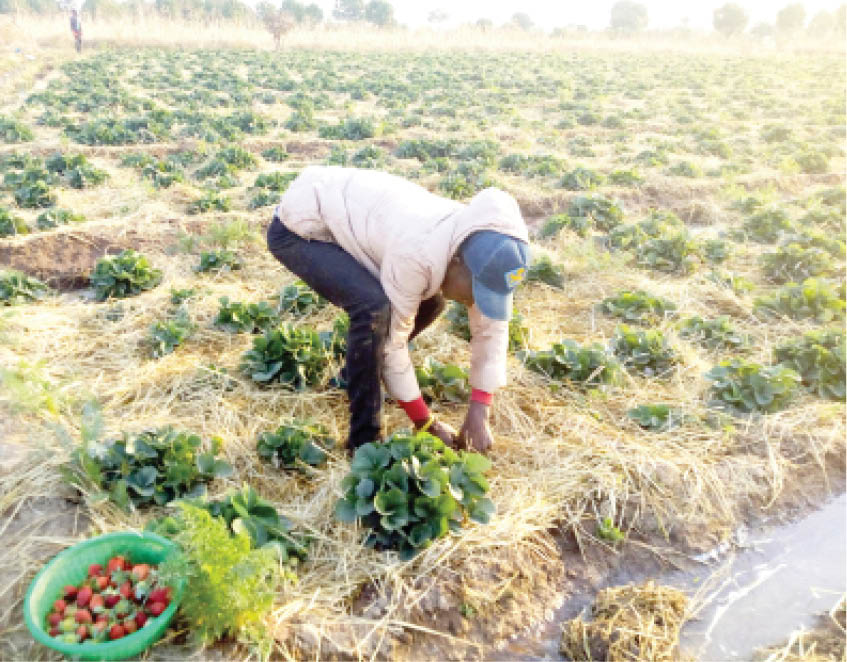Covid-19: Experts urge FG, CBN to localise food production
Many experts say the advent of COVID-19 pandemic and closure of international borders underscore the importance of growing food locally instead of relying on importation. They say a period like this emphasizes the relevance of good policies on import restriction and home-grown food policies championed by the Central Bank of Nigeria (CBN), highlighting areas that […]

Experts are advocating more incentives for local food production
Many experts say the advent of COVID-19 pandemic and closure of international borders underscore the importance of growing food locally instead of relying on importation.
They say a period like this emphasizes the relevance of good policies on import restriction and home-grown food policies championed by the Central Bank of Nigeria (CBN), highlighting areas that needed to be strengthened.
Mrs. Rose Gyar, the director-general, Global Centre for Human Empowerment and Entrepreneurship and an expert in agribusiness, said import restriction was a welcome development.
She said Nigeria should institutionalise the home-grown processes, adding, “It has boosted rice and poultry production in the country, even though the products are not yet competitive.”
She advised the Federal Government and the CBN to first ensure proper data disaggregation of farmers at whatever level of operation rather than using access to interventions for political reasons.
She also called for the provision of support to ensure the institutionalisation of farmers groups with good corporate governance systems that can provide feedbacks in terms of investments and output for proper planning.
Mrs. Gyar noted that the CBN should support market access through patronage of made in Nigeria products by relevant government agencies like Refugee Commission, Ministry of Humanitarian Affairs, Disaster Management and Social Development and its agencies through legislation, as well as corporate shops and supermarkets.
“There is the need for the CBN to deliberately invest in supporting and strengthening institutional capacities of coalitions of these farming groups and cooperatives, recognising inclusive participation of all clusters of citizens engaged in the agric sector, like youths, women and people with disability and albinism as a platform for institutional partnership. This would serve as a peer review mechanism among the groups and engender sustainable partnership with stakeholders and effective service delivery to members, while also engendering competitiveness for serious business and feedback on intervention. This will make credit deployment seamless and impactful,” she said.
Prof. Edwin Ejoga Idu of the Agricultural Economics and Extension Department of the University of Abuja said COVID-19 had proved that growing food locally is the best thing for any country.
“The ban on importation of food items is already yielding economic dividend, especially with respect to increased local production and consumer patronage of home-grown foods.
“We, therefore, recommend that now that COVID-19 has not hit the rural areas, especially the farming communities, and farming season is commencing, the CBN should urgently release the budget provision for the 2020 season in good time to farmers participating in the Anchor Borrowers Programme. More farmers should also be included in the programme, he said.”
Dr Bello Abubakar said the 70,000 metric tons of grains released from silos across the country, which did not include the ones that went to processors, was produced by local farmers through CBN intervention.
“This quantity (70,000mt) was produced by our farmers here in Nigeria, apart from the ones already purchased by food commodity processors,” he said.
Dr. Abubakar advised government to liaise with the CBN to buy directly from farmers on the Anchor Borrowers loan for the strategic grains reserve instead of using contractors.
“The CBN is giving our farmers loan to produce after, which some off-takers will come and buy from our farmers or association at a very low price. So, the Federal Government can liaise with the CBN to off-take directly from the farmers and pay them instead of paying N15,000 per 100kg to contractors who in turn buy at N8,500 from the farmers,” he said.
The Minister of Agriculture and Rural Development, Alhaji Sabo Nanono, said people were beginning to see that government’s effort in the production of food locally is paying off. He noted that with COVID-19, without the closure of international borders, the country would have been in mess.
“People should understand this. And I think that with the foundation of self-sustenance, self-reliance rather than importing anything that is agriculturally related, we will move to other commodities. Also, because of the vulnerability of the situation now, probably a next target will be set in motion to make sure that we produce what we have the potential to produce and feed ourselves without relying on import. Just imagine what would have happened. It would have been a terrible thing,” he said.
